E-course on the MARLISCO educational pack, 19 – 31 May 2015
In May 2015 the third round of the e-course aiming to introduce the educational pack Know, Feel, Act! to Stop Marine Litter to formal and non formal European educators, took place.
The educational material “Know, feel, act! to stop Marine Litter”
The educational pack aims to inform, sensitise and enable teachers and students from Europe and beyond to take action to tackle litter in our seas and coasts. It is available online in many European languages. The pack contains 17 learning activities examining the characteristics, sources, effects and possible ways to tackle the problem, addressing it from an environmental, societal, cultural and economic point of view. It has been designed to primarily serve youth aged 10-15 yrs, but can be used also by educators outside the formal schooling system.
THE E-COURSE RATIONALE & DESIGN
The e-course that is based on the Educational Pack is equivalent to an intensive 2 days long face-to-face seminar with the aim to train learners on effective ways of teaching about marine litter. The estimated total workload for learners is about 16 hrs that is “stretched” over 12-14 days, so that even highly busy people can participate by devoting 1-2 hours daily. The course is asynchronous, which means learners and facilitators don’t have to be online at any specific time, they login at any time convenient to them.
In the e-course an overview of the educational pack is presented, and effective ways it could be incorporated in real life are demonstrated. Trainers and learners shape each time an interactive learning community that simulates activities of the Pack, tests their validity and appropriateness, and suggests ways to adjust and improve them. The obstacles faced in implementing such activities and how to overcome them are also discussed. A critical feature that allows this meaningful interaction amongst learners is that the course is not a MOOC in the sense that it is NOT massive. The learners’ group is of the order of 50-100 people, which allows getting to know each other, our professions, past experiences with litter, and how one can benefit from another, thus shaping a highly interactive learning community.
Another feature of the e-course is that its content is not fixed. Learners are treated as experts and are often requested to generate content. Much of what is to be “learned” comes from those who not only “receive” but also “offer” their insights on the subject. The teachers, NGO and museum staff, surfers, divers, activists, university students that usually take part in the course all share a deep love for the sea, and that could possibly explain their commitment in the course content and the high completion rates.
Last but not least, in the three rounds of its implementation that have taken place already and although its core content remains the same, learners’ comments lead us to amend it every time in order to improve the learning experience of those that take part.
ROUND III RESULTS
In this third round we have had 132 registrations from 28 countries, the majority coming from the Euro-Mediterranean region and a few from far away countries (in alphabetical order: Bermuda, Brazil, Bulgaria, Canada, Cyprus, Egypt, France, Germany, Greece, India, Indonesia, Ireland, Italy, Jordan, Malta, Malta, Morocco, Netherlands, Norway, Pakistan, Palestine, Peru, Portugal, Romania, Slovenia, Spain, Tunisia, Turkey, UK). In this round women greatly outnumbered men, with a ratio 6-7 women: 1 man.
As in the previous rounds, the rates of completion were considered high, compared to the global average of e-course completion. Specifically, from the 132 registrants:
a) 30 (23%) never logged in.
b) 46 (35%) completed only parts of it, while
c) 56 (42%) successfully completed the course
If one takes out the 30 registrants that never logged in, we are left with 102 people that interacted with the course content in full or in parts. Out of these, 56 (55%) successfully completed it, and 46 (45%) did it partially. This high completion rate certainly motivates us to repeat the course if we have the opportunity.
The course was evaluated by the University of Plymouth by the means of a “before and after” questionnaire. Detailed analysis is beyond the scope of this presentation. In the table below the average responses of the 61 trainees that kindly filled the post-course survey are presented. A seven-scale Likert type was used.
|
|
The e-course: |
Average on a 1-7 scale |
Average % |
|
1 |
...was relevant and well linked to the EduPack "Know feel act! to stop marine litter" |
6,52 |
93,2 |
|
2 |
...was the right level of complexity |
6,07 |
86,7 |
|
3 |
...offered sufficient guidance on how to use the EduPack |
6,44 |
92,0 |
|
4 |
…was appropriate and useful for non-formal educators |
6,41 |
91,6 |
|
5 |
…was appropriate and useful for formal educators |
6,3 |
89,9 |
|
6 |
…had an appropriate time allocation (~16 hrs over 13 days) in order to achieve its objectives |
5,44 |
77,8 |
|
7 |
…gave me a good chance to voice my opinions in discussions |
6,30 |
89,9 |
|
8 |
…offered enough opportunity to ask questions |
6,03 |
86,2 |
|
9 |
…was well facilitated by the trainers |
6,39 |
91,3 |
|
10 |
…contained e-tools that I may use in the |
6,54 |
93,4 |
|
11 |
…achieved its objectives as described in the beginning |
6,43 |
91,8 |
|
12 |
…had a satisfactory level of engagement on behalf of the learners |
6,34 |
90,6 |
There is a high degree of trainees’ satisfaction as demonstrated by the average scores in all 12 questions. The course’s time allocation has the lowest score (77,8% satisfaction, a factor commended by some also in their written comments). That means the estimated 16 hrs workload over a span of 13 days is still considered difficult to catch up with. The extra week given to complete assignments certainly helps those that are motivated, but late.
A solid outcome of round III (that was suggested already in previous rounds) was the creation of a F/b group by one of the learners. The group that welcomes the e-course learners from all rounds and anyone with the interest on the subject already has 99 members (as of 15/06/2015): https://www.facebook.com/groups/830616197015450/
In learners’ words ...
Informal evaluation through comments, pledges and other non quantitative indicators is equally important and useful. Here are some quotes of learners that were shared in the e-course discussion forums:
“Motivated by this course to make the first step in order to achieve my vision, first I would organise a clean-up with my friends during high season. I would do that mainly to raise awareness with the other users and hopefully start a discussion with them - even motivate them to join. After that, I would place a couple of "Take 3" signs to remind everyone that it is in our hands to keep this beach clean.” (Elissavet, Greece)
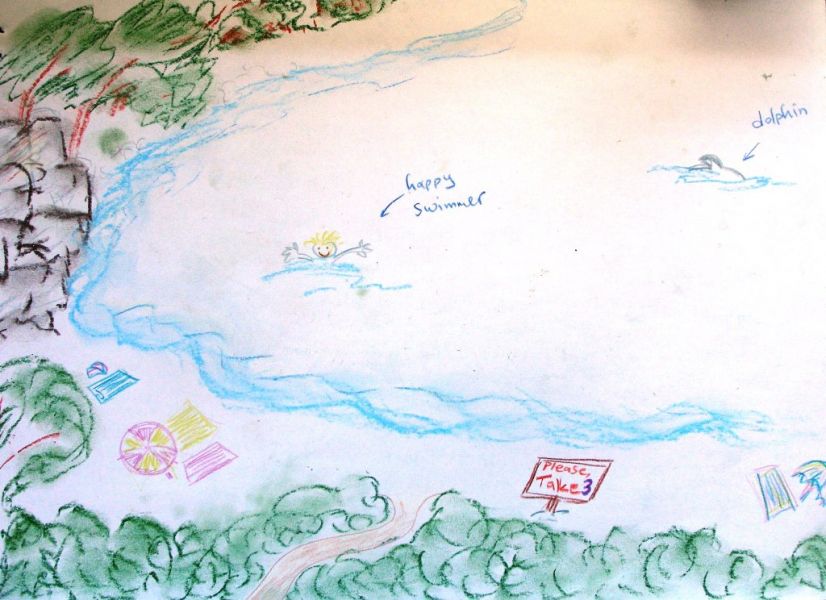
"My vision for the future", sketch drawn by Elissavet, Greece
What will be my involvement? I will show students/peers of all ages how to be environmentally responsible in any way. I already do that, but I am confident that in time I can do more. (Kristina, Romania)
“In my imagined future, most people will change their daily habits thanks to many campaigns of raising awareness on marine litter issue. Local administration will improve waste management by promoting cleanups and the recycling of materials. Bad habits will be punished by means of fines. Marine litter will decrease substantially and natural environment will prevail!” (Laura, Italy)
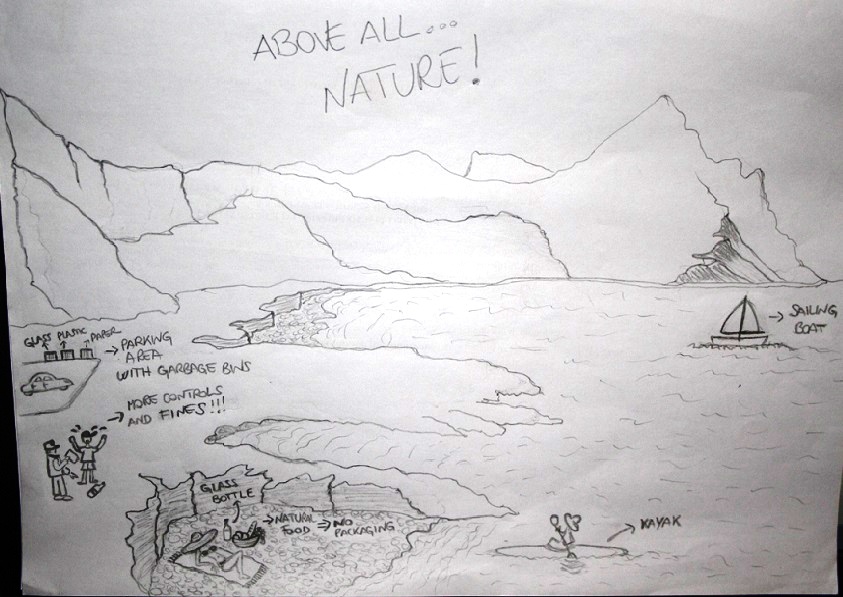
"My vision for the future", sketch drawn by Laura, Italy
My vision for a better and realistic future is a clean beach, I'll recruit some active colleagues and in summer we try to change the culture of people and encourage the governance to put rules, stop to leave plastics, cigarette butt in the beach, use the trash, accept natural elements.(Ibrahim, Egypt)
My vision is everyone wastes responsibly, act with respect for the ecosystem. As the title of the course, everyone needs to know, feel the nature and finally act for the future. (Kalliopie, Greece)
“Environmental campaigns must reach the whole population right before leaving home, likewise community responsibility and engagement to keep places clean, afterwards all benefit from a clean beach. There are jobs to keep, the beach is just an asset from the tourist destination and the environmental resource needs to be balanced with social and economic pillars of sustainability.” (Luis, Portugal)
“I wish I could see again images like the ones I used to see every day during my childhood, when swimming and snorkeling. Like the one I tried to bring back from my memory. It needs a lot of effort. I’ll keep trying and encouraging people to get involved, by using the 3-Rs and its enrichment after the contribution of all of us the co-learners of this course.” (Voula, Greece)
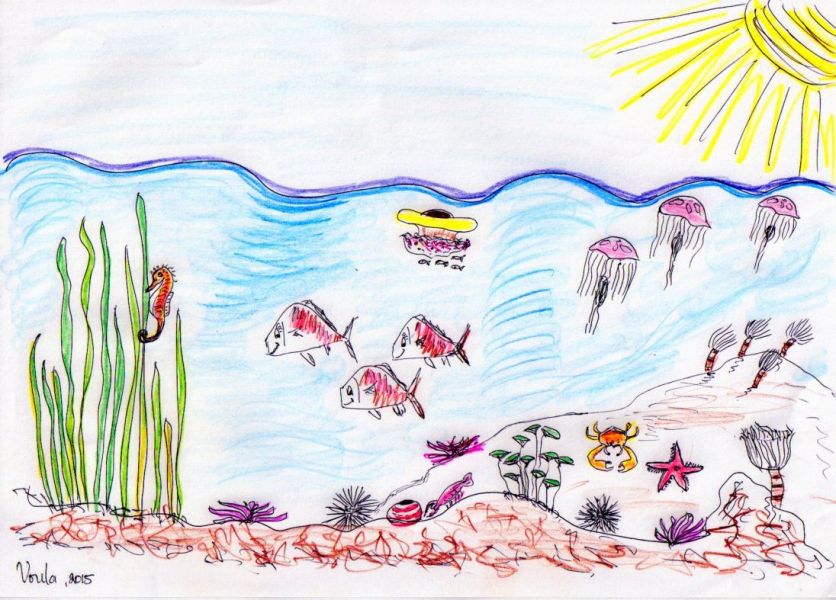
"My vision for the future", sketch drawn by Voula, Greece
“Since dreams come true only if we act upon, I will organize clean ups in the area and coming in contact to the local authorities I will try to improve the current situation like with the installation of more trash bins and recycle bins. Together we can make a difference.” (Yiota Lazarou, Cyprus)
WAY FORWARD
The facilitators are keen on repeating the course even-after the MARLISCO ends. For the future there are some other ideas interesting top explore such as
- Developing a course version for adolescents or children.
- Combining the e-learning with a face-to-face seminar (blended learning)
THE COURSE ORGANISERS
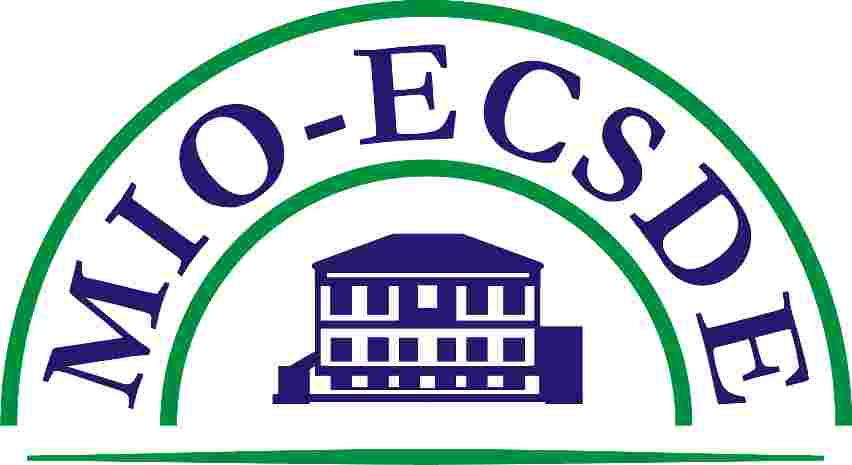
Mediterranean Information Office for Environment, Culture & Sustainable Development (MIO-ECSDE)
Established in 1995 MIO-ECSDE is a non-profit Federation of NGOs from the Mediterranean region working in the field of Environment and Sustainable Development.
Contact MIO-ECSDE: www.mio-ecsde.org, info@mio-ecsde.org
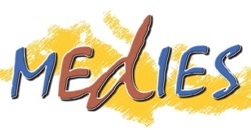
Mediterranean Education Initiative for Environment and Sustainability (MEdIES)
Launched in Johannesburg (WSSD, 2002), MEdIES is MIO-ECSDE’s primal education imitative, with the objective to provide capacity building on ESD through publications, trainings and the facilitation of an e-network of educators.
Contact MEDIES: www.medies.net, info@medies.net